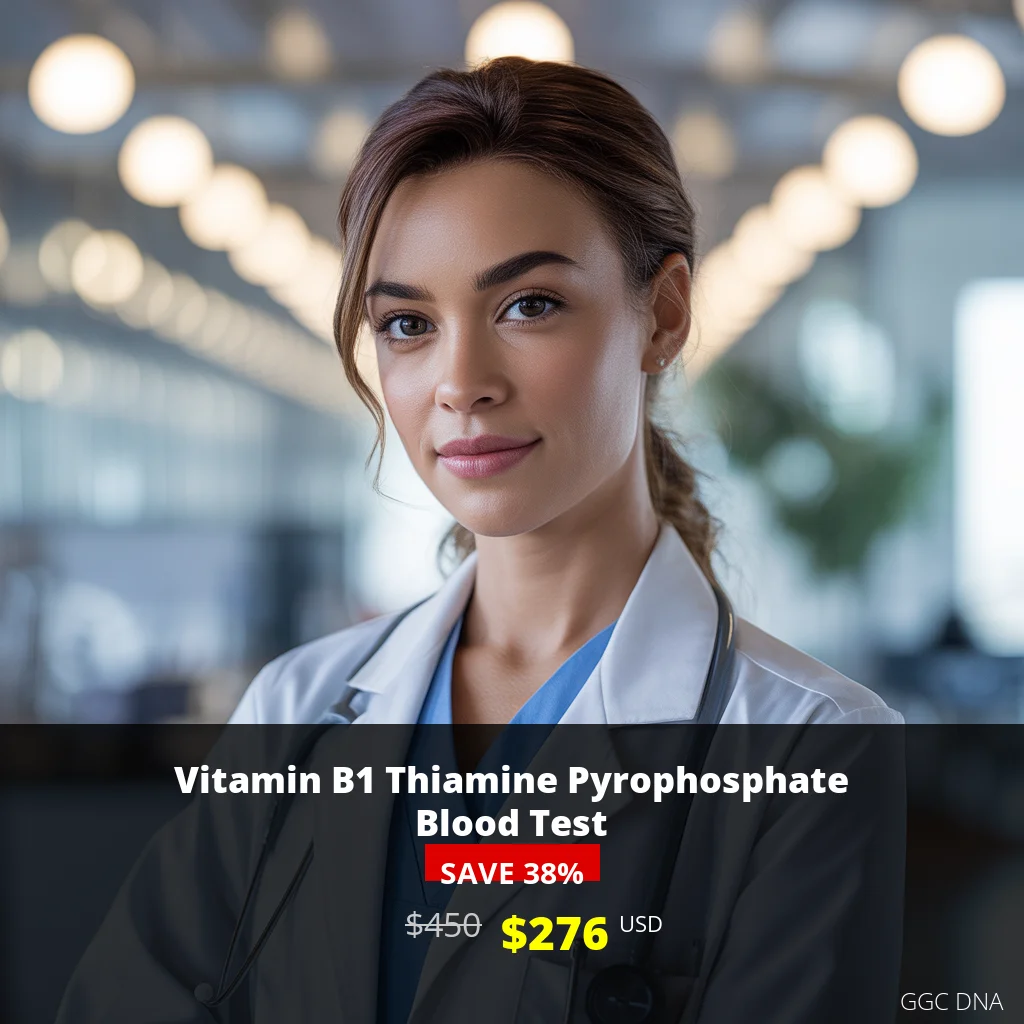Vitamin B1 Thiamine Pyrophosphate Blood Test
Comprehensive Introduction to Thiamine Testing
The Vitamin B1 Thiamine Pyrophosphate Blood Test represents a sophisticated diagnostic approach to evaluating your body’s essential nutrient status. Thiamine, commonly known as vitamin B1, serves as a fundamental coenzyme in numerous metabolic pathways, particularly in energy production from carbohydrates. This specialized test specifically measures thiamine pyrophosphate (TPP), the biologically active form that participates in critical enzymatic reactions throughout your body.
Understanding your thiamine levels is crucial because this vitamin cannot be synthesized by the human body and must be obtained through dietary sources or supplementation. Thiamine deficiency, while often overlooked, can lead to severe neurological and cardiovascular complications if left undiagnosed. Our advanced testing methodology ensures accurate detection of even subtle deficiencies, enabling timely intervention and prevention of serious health consequences.
What This Test Measures and Detects
The Vitamin B1 Thiamine Pyrophosphate Blood Test employs cutting-edge HPLC (High-Performance Liquid Chromatography) with fluorescence detection to precisely quantify the concentration of thiamine pyrophosphate in your bloodstream. This methodology offers exceptional sensitivity and specificity, allowing for:
- Accurate measurement of active thiamine pyrophosphate levels
- Detection of subclinical thiamine deficiencies before symptoms manifest
- Monitoring of thiamine status in individuals with risk factors for deficiency
- Assessment of treatment efficacy in patients receiving thiamine supplementation
This test specifically targets the coenzyme form that participates in pyruvate dehydrogenase complex and transketolase reactions, making it the most clinically relevant indicator of functional thiamine status.
Who Should Consider This Test
Several population groups and individuals with specific symptoms or risk factors would benefit from thiamine pyrophosphate testing:
Symptom-Based Indications
- Unexplained fatigue and weakness
- Neurological symptoms including confusion, memory problems, or coordination difficulties
- Cardiovascular symptoms such as rapid heart rate or shortness of breath
- Muscle pain, tenderness, or wasting
- Gastrointestinal disturbances including nausea and appetite loss
Risk Factor-Based Indications
- Chronic alcohol consumption or alcohol use disorder
- Malabsorption conditions (Crohn’s disease, celiac disease, gastric bypass surgery)
- Prolonged vomiting or hyperemesis gravidarum
- Poor dietary intake, especially in elderly populations
- Patients receiving parenteral nutrition without adequate thiamine supplementation
- Individuals with increased metabolic demands (pregnancy, hyperthyroidism)
Benefits of Thiamine Pyrophosphate Testing
Undergoing comprehensive thiamine assessment provides numerous advantages for your health management:
- Early Deficiency Detection: Identify thiamine insufficiency before severe complications develop
- Neurological Protection: Prevent or manage conditions like Wernicke-Korsakoff syndrome
- Metabolic Optimization: Ensure proper energy production and carbohydrate metabolism
- Cardiovascular Health: Support normal heart function and prevent beriberi-related cardiac issues
- Personalized Supplementation Guidance: Determine appropriate thiamine dosage based on actual deficiency levels
- Treatment Monitoring: Track the effectiveness of thiamine replacement therapy
Understanding Your Test Results
Interpreting your Vitamin B1 Thiamine Pyrophosphate results requires professional medical guidance, but general understanding can help you discuss findings with your healthcare provider:
Normal Range Interpretation
Results within the reference range typically indicate adequate thiamine status, suggesting your dietary intake and absorption are sufficient for normal metabolic functions. However, borderline normal results in high-risk individuals might still warrant attention.
Below Normal Range
Low thiamine pyrophosphate levels suggest deficiency that may require intervention. The severity of deficiency correlates with the extent of deviation from normal ranges and typically guides treatment intensity.
Clinical Correlation
Your physician will correlate laboratory findings with clinical symptoms, dietary history, and risk factors to develop an appropriate management plan. Treatment usually involves thiamine supplementation, dietary modifications, and addressing underlying causes of deficiency.
Test Pricing and Scheduling
| Price Type | Amount (USD) |
|---|---|
| Discount Price | $276 |
| Regular Price | $450 |
Sample Collection and Turnaround
This test requires a 3 mL (2 mL minimum) whole blood sample collected in one Lavender Top (EDTA) tube. Critical handling instructions include complete wrapping with black paper or aluminum foil to protect from light exposure. Samples must be shipped refrigerated or frozen, as uncovered tubes exposed to light are unacceptable for accurate analysis.
Turnaround Time: Samples received by Friday 9 AM typically yield reports by the following Tuesday.
Nationwide Testing Availability
We maintain comprehensive testing facilities across the United States, with convenient locations in all major metropolitan areas including New York, Los Angeles, Chicago, Houston, Phoenix, Philadelphia, San Antonio, San Diego, Dallas, San Jose, and numerous other cities. Our network ensures accessible thiamine testing regardless of your location.
Take Control of Your Nutritional Health
Don’t let thiamine deficiency compromise your wellbeing. Early detection through precise Vitamin B1 Thiamine Pyrophosphate testing can prevent serious neurological and cardiovascular complications. Our advanced HPLC methodology provides the accuracy and reliability you need for confident health decisions.
Ready to assess your thiamine status? Book your test today by calling +1(267) 388-9828 or schedule your appointment through our convenient online booking system. Take the first step toward optimal nutritional health with our comprehensive Vitamin B1 assessment.






